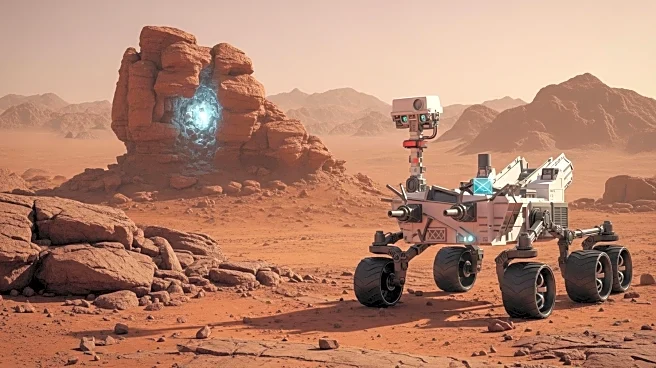What's Happening?
NASA's Mars rover Perseverance has collected samples that may indicate the presence of ancient microbial life on Mars. The rover, which is exploring the Jezero Crater, gathered samples from a rock formation known as 'Cheyava Falls.' These samples, described as having 'leopard-like spots,' are considered potential biosignatures, which are substances that might have a biological origin. NASA associate administrator Nick Fox highlighted that these samples resemble signatures typically produced by biological processes. However, further testing is required to confirm whether these samples indeed indicate past life on Mars. The samples have been stored for additional analysis as Perseverance continues its mission.
Why It's Important?
The discovery of potential biosignatures on Mars is significant as it could provide evidence of life beyond Earth, fundamentally altering our understanding of the universe. If confirmed, this finding would have profound implications for astrobiology, potentially guiding future missions to Mars and other celestial bodies. It could also influence the search for life on exoplanets, expanding the scope of scientific inquiry into the conditions necessary for life. The potential discovery of ancient life forms on Mars could also impact philosophical and ethical discussions about humanity's place in the cosmos.
What's Next?
The next steps involve rigorous testing of the collected samples to determine their origin. Scientists will analyze the samples to ascertain whether the biosignatures are indeed biological or if they could be explained by non-biological processes. The results of these tests will be crucial in confirming the presence of ancient life on Mars. Additionally, the findings may influence the planning and objectives of future Mars missions, potentially prioritizing areas with similar geological features for exploration.
Beyond the Headlines
The potential discovery of ancient life on Mars raises questions about the ethical implications of human exploration and potential colonization of the planet. It prompts a reevaluation of planetary protection policies to prevent contamination of extraterrestrial ecosystems. Furthermore, it could inspire a renewed interest in space exploration and science education, encouraging investment in technologies that support interplanetary research.









